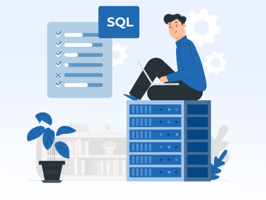In today's data-driven world, businesses are awash with data from various sources. Harnessing this...
EDI Software Development: Streamlining Data Exchange for Efficient Business Operations
Introduction
Welcome to the world of EDI software development, where cutting-edge technology is reshaping the way businesses exchange information and manage their operations. Electronic Data Interchange, commonly known as EDI, is a process that allows the seamless and automated exchange of business documents between different companies. The EDI software facilitates the transfer of data in a structured format, streamlining workflows and eliminating the need for manual data entry, leading to improved productivity and reduced errors.
In this article, we'll delve into the intricacies of EDI software development, explore its benefits and applications, and understand how it has become a key enabler for modern businesses across various industries.
EDI Software Development: Empowering Efficient Data Exchange
As businesses continue to grow and evolve in today's digital landscape, the demand for efficient data exchange has never been more critical. Traditional methods of exchanging information, such as paper-based documentation and email attachments, are not only time-consuming but also prone to errors. Here's where EDI software development comes into play, revolutionizing data exchange and empowering businesses to thrive in the digital age.
How EDI Software Works: Under the Hood
To comprehend the value of EDI software, let's take a peek under the hood and explore how it works. EDI systems use a standardized language to translate business documents into a format that computers can understand. This language is commonly known as EDI messages, and it follows various standards like ANSI X12 and EDIFACT.
When a company implements EDI software, it sets up a connection with its trading partners and clients. These connections can be point-to-point, through VANs (Value-Added Networks), or through AS2 (Applicability Statement 2) connections over the internet. Once the connection is established, the EDI software can seamlessly transmit purchase orders, invoices, shipment notices, and other documents between the parties.
Benefits of EDI Software Development
EDI software development brings forth a plethora of benefits for businesses of all sizes, making it a game-changer in the corporate world. Let's explore some of the most prominent advantages:
1. Enhanced Efficiency and Productivity
With manual data entry out of the equation, EDI software significantly reduces the time and effort required for data exchange. This streamlined process leads to increased efficiency, faster transactions, and improved productivity for all stakeholders involved.
2. Elimination of Errors and Data Redundancies
The manual handling of documents is often prone to errors, which can lead to costly mistakes and data redundancies. EDI software eradicates these issues, ensuring that data is accurately transferred between systems, reducing the risk of errors and improving data accuracy.
3. Cost Savings
By eliminating paper-based processes and manual interventions, EDI software helps businesses cut costs associated with printing, postage, and administrative tasks. Moreover, the swift and accurate data exchange reduces the need for dispute resolutions, further driving down operational expenses.
4. Faster Order Processing and Fulfillment
With EDI software in place, order processing becomes streamlined and automated, leading to faster order fulfillment. This not only enhances customer satisfaction but also strengthens business relationships.
5. Scalability and Flexibility
EDI software solutions are highly scalable, adapting to the changing needs of businesses as they grow. Whether a company is dealing with a few trading partners or hundreds, EDI can accommodate the expansion effortlessly.
6. Strengthened Business Relationships
The efficient and error-free exchange of data builds trust and reliability among business partners, fostering strong and long-lasting relationships. This reliability is crucial for businesses engaged in frequent transactions and collaborations.
Applications of EDI Software Development
EDI software development has found widespread applications across various industries, transforming the way they operate and communicate. Some of the key industries leveraging the power of EDI include:
1. Retail and eCommerce
In the fast-paced world of retail and eCommerce, EDI software ensures seamless order processing, inventory management, and shipping notifications, keeping supply chains running smoothly.
2. Healthcare
In the healthcare sector, EDI enables secure and efficient transmission of patient records, insurance claims, and billing information between hospitals, clinics, and insurance providers.
3. Manufacturing
EDI facilitates smooth communication between manufacturers, suppliers, and distributors, helping in managing inventory levels, production schedules, and shipping activities.
4. Automotive
In the automotive industry, EDI software plays a pivotal role in supply chain management, tracking spare parts, and managing just-in-time deliveries.
5. Finance and Banking
EDI is utilized in the finance and banking sector for secure and swift electronic fund transfers, reducing transaction time and enhancing accuracy.
The Future of EDI Software Development
As technology continues to evolve, the future of EDI software development looks promising. Advancements in cloud computing, artificial intelligence, and blockchain technology are expected to bring even more efficiency, security, and transparency to the EDI process.
FAQs
Q: What is EDI software development, and how does it work?
EDI software development involves creating and implementing systems that enable businesses to exchange business documents electronically. The software follows standardized formats to convert documents into a language that computers can understand. Once set up, it facilitates the automated and seamless transfer of data between trading partners and clients.
Q: What are the benefits of using EDI software?
EDI software offers numerous advantages, including enhanced efficiency, reduced errors, cost savings, faster order processing, scalability, and strengthened business relationships.
Q: In which industries is EDI software commonly used?
EDI software finds applications in various industries, including retail and eCommerce, healthcare, manufacturing, automotive, and finance.
Q: How does EDI software contribute to supply chain management?
EDI software streamlines supply chain management by facilitating quick and accurate data exchange between manufacturers, suppliers, distributors, and retailers. This improves inventory management, order processing, and shipment tracking.
Q: What does the future hold for EDI software development?
The future of EDI software development looks promising with advancements in cloud computing, artificial intelligence, and blockchain technology, promising even greater efficiency and security in data exchange.
Q: Is EDI software scalable for businesses of different sizes?
Yes, EDI software is highly scalable and can accommodate the needs of businesses, whether they are small startups or large enterprises dealing with multiple trading partners.
Conclusion
EDI software development has emerged as a revolutionary solution for businesses seeking streamlined and efficient data exchange processes. With its ability to automate transactions, reduce errors, and enhance productivity, EDI software has become a crucial component for modern businesses across various industries. As technology continues to progress, the future of EDI software development holds even greater potential for further transforming the way we conduct business and collaborate with partners and clients.


